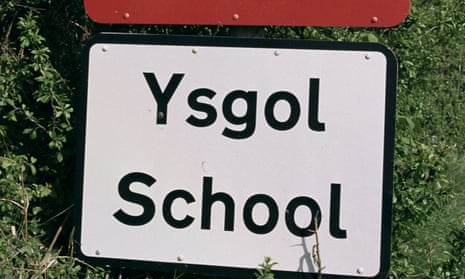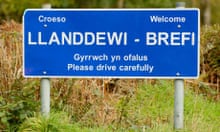Last weekend I took part in a festival called Gwyl Arall in my home in north Wales, where I gave a talk in Welsh (well actually, half Welsh – the organisers were kind enough to make allowances for my deteriorating skills). When I told friends in England what I was doing, many responded as though I’d just announced I was travelling to the Acropolis to deliver a sermon in ancient Greek. “People still speak Welsh?” is a common refrain all Cymrys living in England are accustomed to hearing.
Welsh evolved from Brittonic (meaning indigenous Breton, as opposed to Anglo-Saxon), and until the Romans came along, it was spoken in England too. The Welsh language is not a backwards, insignificant thing; it is a fundamental part of Britain’s collective history. I find it absurd that so few English people realise it is still spoken in families and communities across Wales, as part of a Brittonic culture which has survived through the ages. As part of my childhood, I learned traditional Welsh dance (downsio gwerin), recited Welsh poetry and sang Cerdd Dant (a type of vocal and harp music) during Eisteddfodau (the Welsh culture festival). I joined the Urdd (the Welsh League of Youth); read the Mabinogion (a collection of Welsh mythological stories) in school; and I spoke Welsh so fluently I barely noticed when people switched from English to Welsh. I did all these things as part of an indigenous Celtic culture I’ve inherited by being born in Wales – a culture that isn’t unique to my small and beautiful corner of the country, but at one time reached across Britain and has helped shape it.
With the Scottish independence referendum looming, debates about what Britain is and who the British are have become more significant. Adam Ramsay, as part of Open Democracy’s Scotland’s Future series, has written a series of pieces in favour of independence – many of which have hovered over the questions of British identity. In one piece, he lambasts no advocate Danny Alexander for being blinded by “bombastic British nationalism”.
I’ve loved reading these pieces by Ramsay (though I make no argument either way about independence here), but I take issue with his criticism of British nationalism. To me, what Alexander is defending is not British nationalism, but a type of English nationalism that sees Britain as a “greater” England and Wales, Northern Ireland and Scotland as subordinates whose cultures exist as only anachronistic novelties. I’m sure that’s what Ramsay was driving at in his piece, but that’s not British nationalism, it’s English nationalism, English entitlement – and Wales is suffering under it too.
There are many economic, social and cultural reasons for Scotland’s yes campaign to have reached such an unexpected level of success; but from my Welsh point of view I suspect that one reason must surely be frustration at the way that the English domination of Britain has led to the marginalisation – if not jingoistic ridiculing – of Scottish and Welsh identity. Our unique cultures and languages are habitually erased in favour of an umbrella Englishness. To take a trivial example: the book and Twitter account Very British Problems portrays the British as socially awkward, Earl Grey-sipping Hugh Grant caricatures. But that’s not an image I recognise from Wales – it’s not even an image I recognise in a lot of England (try looking for a stiff upper-lip on a night bus in Liverpool). It’s a particular stereotype of the English upper-middle classes which has been extrapolated to represent everyone in Britain, overshadowing Scotland, Northern Ireland and Wales (and the English working class) in the process.
It’s time to end the English domination of Wales and Scotland, regardless of outcome of the referendum in September. To do this, I propose schoolchildren take part in compulsory lessons in Welsh and Scottish studies, during which they at least learn how to speak basic Welsh. I don’t see why not: Welsh is an official British language, the oldest language in Europe and the most common in Britain after English.
Many will write this off as a ludicrous proposal, but in doing so they reveal, to quote Ramsay again, “something fascinating about the nature of British nationalism – how it is so ubiquitous as to be unnoticed; so hegemonic, as to go unchallenged.” After all, nobody would find it ludicrous to expect Welsh and Scottish schoolchildren to learn the English language and English history, and to imbibe English culture as a necessary result of its dominance.
If the British government really wants a United Kingdom, as it claims to, then it needs to give the other countries currently in the union an equal place. This is not just an issue of fairness; it’s also the simple fact that English people too have a right to understand their own history and culture, which was formed – in part – by Wales, Scotland and Ireland. If the Scottish people do vote no in September, Westminster should not take that as a validation of English empire. For the good of the many component parts, languages, and cultures that make up Britain, it’s time for something different.



